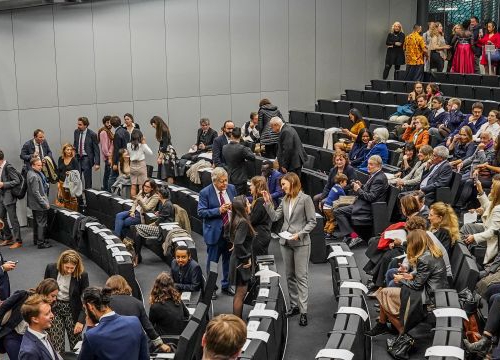Three Prizes Reward Graduating Students for their Exceptional Academic Work


Arthur Nguyen dao
29 October 2019
Our LLM in International Humanitarian Law and Human Rights (LLM) and Master of Advanced Studies in Transitional Justice, Human Rights and the Rule of Law (MTJ) involve the drafting of a paper on a specific issue addressed in the programme, under the guidance of a faculty member.
‘This exercise gives students an opportunity to investigate a subject of special interest to them, develop their own critical thinking, and deepen their expertise through research and exchanges with experts. As the paper is quite short – around 20 pages – it also requires students to be able to address complex questions in a concise manner without oversimplifying them’ stresses Marco Sassòli, Director of the Geneva Academy.
Every year, at the Graduation Ceremony, three students – two from the LLM and one from the MTJ – are rewarded for their exceptional academic work via three prizes: the Henry Dunant Research Prize, the Best LLM Paper Prize and the Best MTJ Paper Prize.
Armed Non-State Actors and International Humanitarian Law
The two LLM papers rewarded this year address issues related to armed non-state actors (ANSAs) and international humanitarian law (IHL).
‘This is a key contemporary IHL challenge as most conflicts today involved ANSAs. We’re very pleased to see that our students addressed this challenge in an innovative and solution-oriented manner’ explains Marco Sassòli, Director of the Geneva Academy.
The Foundation Prix Henry Dunant, in partnership with the Geneva Academy, awarded the 2019 Henry Dunant Research Prize to Lizaveta Tarasevich for her LLM paper ‘Participation of Non-State Armed Groups in the Formation of Customary International Humanitarian Law: Arising Challenges and Possible Solutions’.
‘The paper discusses a difficult issue, which is often neglected even by those who suggest that the practice of armed groups should be taken into account when determining customary IHL of non-international armed conflicts: how which practice of which armed groups can count as practice for customary law and what is the relationship between this practice and state practice when assessing the customary character of a rule. The author goes further than anything that has been written up to now on this question and suggests leads for solutions’ underlines Marco Sassòli, Director of the Geneva Academy.

Zoi Lafazani received the 2019 Best LLM Paper Prize for her LLM paper ‘Rebel Laws: The capacity of ANSAs to legislate on the domestic plane under IHL’.
‘The topic and content of this paper are very innovative, filling a gap in the existing scientific literature related to ANSAs and IHL: answers to the question whether and how armed groups can create the legislation necessary to comply with many human rights rules and some IHL provisions. The paper is well structured and written and the analysis is coherent and accurate. Zoi Lafzani added many personal critical evaluations and provided with a long and interesting conclusion’ explains Dr Annyssa Bellal, Senior Research Fellow and Strategic Advisor on IHL at the Geneva Academy.

Transitional Justice in Contexts of Grave Humanitarian Crisis and Displacement
Valeria Reyes Menendez received the 2019 Best MTJ Paper Prize for her paper ‘Transitional Justice in Contexts of Grave Humanitarian Crisis and Displacement: A draft proposal for the case of Venezuela’.
‘As identified by the former UN Special Rapporteur on transitional justice, Pablo de Greiff, one of the biggest transitional justice challenge is the transfer of transitional justice mechanisms from post-authoritarian contexts to conflict and post-conflict situations like South Sudan, Central African Republic, Sri Lanka, Syria, Afghanistan or Burundi’ explains Thomas Unger, Co-Director of the MTJ.
‘This paper addresses this challenge in a highly innovative way: through a case study on Venezuela, it succeeds in showing the limits of conventional transitional justice policy and concepts for contemporary conflicts and offers some concrete recommendations on how to expand the field of transitional justice’ he adds.












